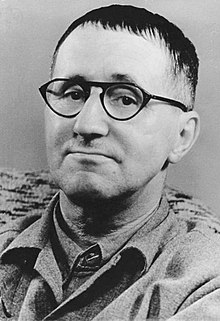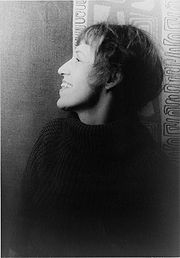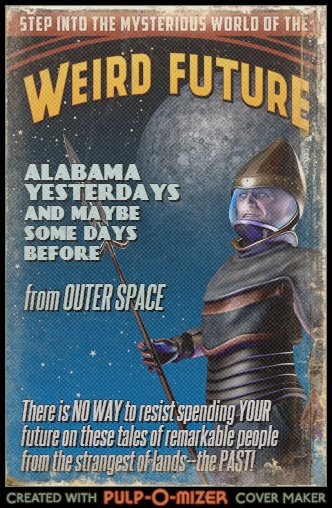And no, this one is not the "Alabama Song" on Allison Moorer's album of the same name. This "Alabama Song" is also known as "Whiskey Bar", "Moon Over Alabama" and "Moon of Alabama" and it began life deep in the heart of 1920's Germany.
The lyrics originated with German poet, playwright and theatrical director Bertolt Brecht [1898-1956]. Written in 1925, they first appeared in his collection Hauspostille [Manual of Piety in Eric Bentley's 1966 translation] two years later.
In that same year Brecht began a collaboration with composer Kurt Weill [1900-1950] on Mahagonny-Songspiel, a short opera they prepared for the Baden-Baden Festival. German singer and actress and Weill's wife, Lotte Lenya [1898-1981], playing the prostitute Jessie in that production, first sang the song in public. "Alabama Song" and one other piece were performed in English, with translation provided by frequent Brecht collaborator Elisabeth Hauptmann [1897-1973].
By 1930 the songs of the short opera had been included in Brecht and Weill's epic political satire, The Rise and Fall of the City of Mahagonny, where the prostitute character's name has become Jenny. The longer work was first performed in Leipzig in March 1930.
Lenya did not appear in the new opera, but she released a recording of "Alabama Song" to coincide with its premiere. Lenya continued to perform the song for the remainder of her career. She did play the prostitute Jenny character in the 1928 premiere of Brecht and Weill's best-known work, The Threepenny Opera. That work, performed over 10,000 times around the world, continues to be popular and is famous for introducing the song "Mack the Knife."Lenya is perhaps best remembered today for her role as Rosa Klebb in the second James Bond film, From Russia with Love.
The lyrics below are those used in the Door's 1966 recording. An amazing variety of other artists have performed "Alabama Song" over the years. The Mitchell Trio folk group included it on a 1964 album. Bette Midler included the number in her shows in 1977 and it's available on her Live at Last album. David Bowie, Nina Simone, Marianne Faithfull, David Johansen, and Marilyn Manson have all recorded or performed the song. Numerous others are included on a lengthy list on Wikipedia.
I have a CD "All that Jazz: The Best of Ute Lemper" released in 1998. On it Lemper performs several Kurt Weill songs, including "Alabama-Song." The German singer and actress is a well-known modern interpreter of Weill's work.
In 1965 the album Mack The Knife And Other Berlin Theatre Songs Of Kurt Weill was released featuring saxophonist Eric Dolphy and pianist John Lewis of the Modern Jazz Quartet. The album opened with "Alabama Song", recorded in January 1964 just six months before Dolphy's death.
The album was reissued with additional tracks in 2008; the cover of that version is below. You can hear it on YouTube along with other versions under the various titles. According to the Wikipedia article on the song linked above, trombonist and arranger of the song Mike Zwerin asked Dolphy to "play what [he] felt about Alabama."
Now we come to the question of the hour. What in the world does this song have to do with Alabama? Beats me, although we do have plenty of whiskey bars, moons, mamas and dying in the state. Perhaps it just seemed exotic to some artistic Germans in the 1920's; perhaps the word fit the rhythm.
After the Nazis came to power, the work of Brecht and Weill was banned and they, along with Hauptmann, immigrated to the United States until after World War II. Whether they ever visited Alabama during those years is unknown.

Bertolt Brecht
Source: Wikipedia
Weill in 1932
Source: Wikipedia

Lenya as photographed by Carl Van Vechten in 1962
Source: Wikipedia

A 1930 recording of the song by Lotte Lenya
Source: Internet Archive
Source: Discogs.com
Well, show me the way
To the next whisky bar
Oh, don't ask why
Oh, don't ask why
To the next whisky bar
Oh, don't ask why
Oh, don't ask why
Show me the way
To the next whisky bar
Oh, don't ask why
Oh, don't ask why
To the next whisky bar
Oh, don't ask why
Oh, don't ask why
For if we don't find
The next whisky bar
I tell you we must die
I tell you we must die
I tell you, I tell you
I tell you we must die
The next whisky bar
I tell you we must die
I tell you we must die
I tell you, I tell you
I tell you we must die
Oh, moon of Alabama
We now must say goodbye
We've lost our good old mama
And must have whiskey, oh, you know why
We now must say goodbye
We've lost our good old mama
And must have whiskey, oh, you know why
Oh, moon of Alabama
We now must say goodbye
We've lost our good old mama
And must have whisky, oh, you know why
We now must say goodbye
We've lost our good old mama
And must have whisky, oh, you know why
Well, show me the way
To the next little girl
Oh, don't ask why
Oh, don't ask why
To the next little girl
Oh, don't ask why
Oh, don't ask why
Show me the way
To the next little girl
Oh, don't ask why
Oh, don't ask why
To the next little girl
Oh, don't ask why
Oh, don't ask why
For if we don't find
The next little girl
I tell you we must die
I tell you we must die
I tell you, I tell you
I tell you we must die
The next little girl
I tell you we must die
I tell you we must die
I tell you, I tell you
I tell you we must die
Oh, moon of Alabama
We now must say goodbye
We've lost our good old mama
And must have whisky, oh, you know why
We now must say goodbye
We've lost our good old mama
And must have whisky, oh, you know why


